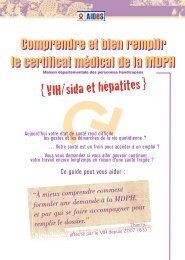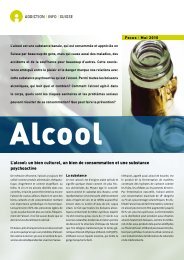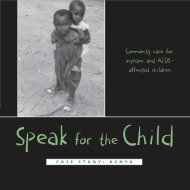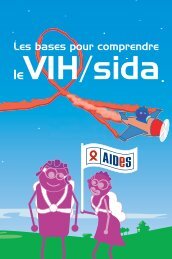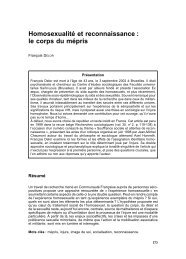Care and support for people living with HIV/AIDS
Care and support for people living with HIV/AIDS
Care and support for people living with HIV/AIDS
Create successful ePaper yourself
Turn your PDF publications into a flip-book with our unique Google optimized e-Paper software.
The Joint United Nations Programme on <strong>HIV</strong>/<strong>AIDS</strong> (UN<strong>AIDS</strong>) brings together seven United Nations systemorganizations to help the world prevent new <strong>HIV</strong> infections, care <strong>for</strong> those already infected <strong>and</strong> mitigatethe epidemic’s impact. The UN<strong>AIDS</strong> Cosponsors are:The United Nations Children’s Fund (UNICEF), acting <strong>with</strong>in the framework of the Convention on the Rights of the Child,works <strong>with</strong> governments <strong>and</strong> nongovernmental organizations in the fields of health, nutrition, basic education, saferwater <strong>and</strong> sanitation to improve the lives of children, youth <strong>and</strong> women. It brings to UN<strong>AIDS</strong> its operational field capacityin over 160 countries. UNICEF’s priority programme areas <strong>for</strong> <strong>HIV</strong>/<strong>AIDS</strong> focus on prevention of infection, especiallyof adolescents, school <strong>AIDS</strong> education, children <strong>and</strong> families affected by <strong>AIDS</strong>, <strong>and</strong> mother-to-child <strong>HIV</strong> transmission.The United Nations Development Programme (UNDP) works to increase underst<strong>and</strong>ing of the social <strong>and</strong> economicimpact of <strong>HIV</strong>/<strong>AIDS</strong> on development; to create effective gender-sensitive multisectoral <strong>HIV</strong>/<strong>AIDS</strong> policies <strong>and</strong> povertyreduction strategies; <strong>and</strong> to strengthen institutional management, aid coordination <strong>and</strong> disbursement mechanisms.UNDP advocates <strong>for</strong> increased development funding <strong>and</strong> <strong>for</strong> actions to break the silence surrounding the epidemic. Itpromotes discussion <strong>and</strong> implementation of policies that integrate <strong>HIV</strong>/<strong>AIDS</strong> into national development strategies,poverty reduction strategies <strong>and</strong> institutional re<strong>for</strong>m. UNDP acts as an honest broker in bringing together effectivecommunity-based programmes <strong>with</strong> potential sources of funding.The m<strong>and</strong>ate of the United Nations Population Fund (UNFPA) is, inter alia, to build the knowledge <strong>and</strong> capacity ofcountries to respond to needs in the area of population, <strong>with</strong> a major focus on reproductive health, including familyplanning <strong>and</strong> sexual health. UNFPA contributes to UN<strong>AIDS</strong>’ m<strong>and</strong>ate through its worldwide network of country offices;its expertise in reproductive health promotion <strong>and</strong> service delivery; its experience in logistics <strong>and</strong> management ofreproductive health commodities, including condoms; <strong>and</strong> its experience in working <strong>with</strong> nongovernmental organizations,in organizing technical assistance <strong>and</strong> in strengthening national capacity-building.The United Nations International Drug Control Programme (UNDCP) is entrusted <strong>with</strong> exclusive responsibility <strong>for</strong>coordinating <strong>and</strong> providing effective leadership <strong>for</strong> all United Nations drug control activities. In this context UNDCP isactive in <strong>support</strong>ing <strong>HIV</strong>/<strong>AIDS</strong> prevention in programmes to reduce the dem<strong>and</strong> <strong>for</strong> illicit drugs. Its primary focus ison youth <strong>and</strong> high-risk groups. UNDCP operates from its headquarters in Vienna, Austria, as well as from a field networkcurrently serving 121 countries <strong>and</strong> territories.The m<strong>and</strong>ate of the United Nations Educational, Scientific <strong>and</strong> Cultural Organization (UNESCO) is to foster internationalcooperation in intellectual activities designed to promote human rights, help establish just <strong>and</strong> lasting peace,<strong>and</strong> further the general welfare of mankind. UNESCO contributes to UN<strong>AIDS</strong> by virtue of the scope of its fields of competence,its interdisciplinary <strong>and</strong> cross-disciplinary approaches, <strong>and</strong> its experience, <strong>and</strong> by bringing the vast networkof institutions <strong>with</strong> which it collaborates into the fight against <strong>AIDS</strong>.WHOAs a leading international health authority, the World Health Organization (WHO) <strong>support</strong>s countries to strengthentheir health system’s response to the epidemics of <strong>HIV</strong>/<strong>AIDS</strong> <strong>and</strong> sexually transmitted infections. Its major focus is onprevention of <strong>HIV</strong> <strong>and</strong> sexually transmitted infections; vaccines <strong>and</strong> microbicides; prevention of mother-to-child transmissionof <strong>HIV</strong>; blood safety; epidemiological <strong>and</strong> behavioural surveillance; safe injection practice; strengthening ofhealth systems; voluntary counselling <strong>and</strong> testing; management of <strong>HIV</strong>-related illnesses; alternatives <strong>and</strong> complementsto hospital care; <strong>and</strong> access to drugs.WORLD BANKThe m<strong>and</strong>ate of the World Bank is to alleviate poverty <strong>and</strong> improve the quality of life. Between 1986 <strong>and</strong> late 1999, theWorld Bank committed over US$ 980 million <strong>for</strong> more than 75 <strong>HIV</strong>/<strong>AIDS</strong> projects worldwide. Most of the resources havebeen provided on highly concessional terms. To more effectively address the devastating consequences of <strong>HIV</strong>/<strong>AIDS</strong> ondevelopment, the Bank is strengthening its response to the epidemic, working in partnership <strong>with</strong> UN<strong>AIDS</strong>, donor agencies<strong>and</strong> governments. The Bank’s “Intensifying Action against <strong>HIV</strong>/<strong>AIDS</strong> in Africa” strategic plan aims to rapidly increaseaction <strong>and</strong> available resources <strong>and</strong> to bring to scale the interventions needed <strong>for</strong> prevention <strong>and</strong> impact mitigation.ISBN: 92-9173-000-9



